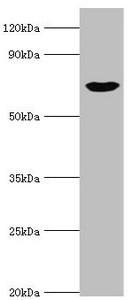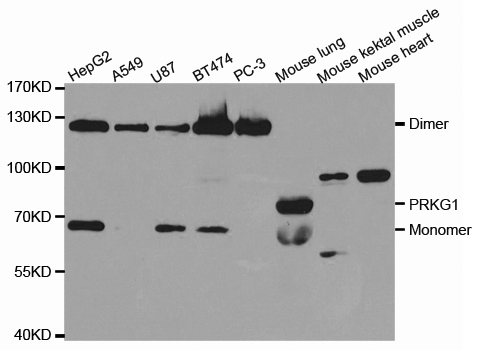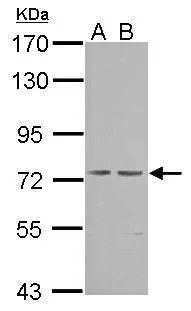
Western blot All lanes: cGMP-dependent protein kinase 1 antibody at 3ug/ml + Mouse lung tissue Secondary Goat polyclonal to rabbit IgG at 1/10000 dilution Predicted band size: 77, 78, 45 kDa Observed band size: 77 kDa
PRKG1 Antibody
CSB-PA619797ESR2HU
ApplicationsWestern Blot, ELISA
Product group Antibodies
ReactivityHuman, Mouse
TargetPRKG1
Overview
- SupplierCusabio
- Product NamePRKG1 Antibody
- Delivery Days Customer20
- ApplicationsWestern Blot, ELISA
- CertificationResearch Use Only
- ClonalityPolyclonal
- ConjugateUnconjugated
- Gene ID5592
- Target namePRKG1
- Target descriptionprotein kinase cGMP-dependent 1
- Target synonymsAAT8, PKG, PKG1, PRKG1B, PRKGR1B, cGK, cGK 1, cGK1, cGKI, cGKI-BETA, cGKI-alpha, cGMP-dependent protein kinase 1, protein kinase, cGMP-dependent, regulatory, type I, beta, protein kinase, cGMP-dependent, type I
- HostRabbit
- IsotypeIgG
- Protein IDQ13976
- Protein NamecGMP-dependent protein kinase 1
- Scientific DescriptionSerine/threonine protein kinase that acts as key mediator of the nitric oxide (NO)/cGMP signaling pathway. GMP binding activates PRKG1, which phosphorylates serines and threonines on many cellular proteins. Numerous protein targets for PRKG1 phosphorylation are implicated in modulating cellular calcium, but the contribution of each of these targets may vary substantially among cell types. Proteins that are phosphorylated by PRKG1 regulate platelet activation and adhesion, smooth muscle contraction, cardiac function, gene expression, feedback of the NO-signaling pathway, and other processes involved in several aspects of the CNS like axon guidance, hippocampal and cerebellar learning, circadian rhythm and nociception. Smooth muscle relaxation is mediated through lowering of intracellular free calcium, by desensitization of contractile proteins to calcium, and by decrease in the contractile state of smooth muscle or in platelet activation. Regulates intracellular calcium levels via several pathways: phosphorylates MRVI1/IRAG and inhibits IP3-induced Ca2+ release from intracellular stores, phosphorylation of KCNMA1 (BKCa) channels decreases intracellular Ca2+ levels, which leads to increased opening of this channel. PRKG1 phosphorylates the canonical transient receptor potential channel (TRPC) family which inactivates the associated inward calcium current. Another mode of action of NO/cGMP/PKGI signaling involves PKGI-mediated inactivation of the Ras homolog gene family member A (RhoA). Phosphorylation of RHOA by PRKG1 blocks the action of this protein in myriad processes: regulation of RHOA translocation; decreasing contraction; controlling vesicle trafficking, reduction of myosin light chain phosphorylation resulting in vasorelaxation. Activation of PRKG1 by NO signaling alters also gene expression in a number of tissues. In smooth muscle cells, increased cGMP and PRKG1 activity influence expression of smooth muscle-specific contractile proteins, levels of proteins in the NO/cGMP signaling pathway, down-regulation of the matrix proteins osteopontin and thrombospondin-1 to limit smooth muscle cell migration and phenotype. Regulates vasodilator-stimulated phosphoprotein (VASP) functions in platelets and smooth muscle.
- ReactivityHuman, Mouse
- Storage Instruction-20°C or -80°C
- UNSPSC41116161







